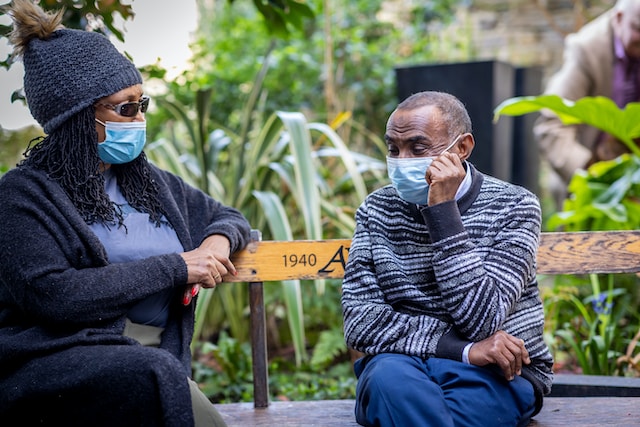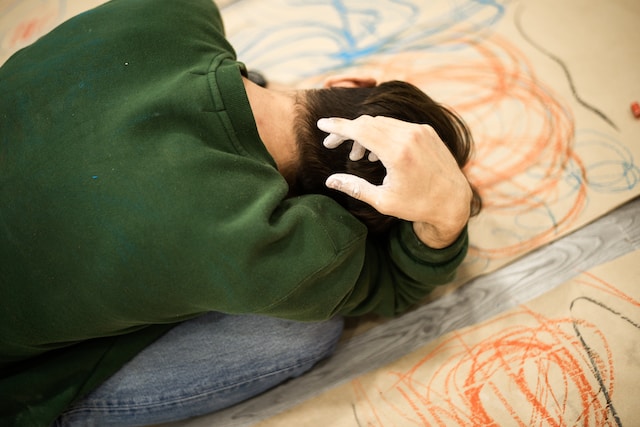
Mood disorders are one of the most common reasons that people come to therapy. These are the depressive “disorders” that commonly affect mood. Note that we don’t “disorder” is just a medical term. We believe that all humans live on spectrums of different conditions. There’s nothing wrong with you for experiencing symptoms of depression. Nevertheless, it can be helpful to know the basic diagnosis you may have in order to seek the best form of help. Many of our therapists use a variety of different treatment approaches to help you through depression and related mood disorders.
Browse our Therapist Directory
Quick Navigation
- What Is a Mood Disorder?
- Types of Mood Disorders
- How Does Therapy Help With Mood Disorders?
- What Types of Therapy Help Mood Disorders?
- Next Steps
What Is a Mood Disorder?
A mood disorder is a type of mental health condition that affects an individual’s emotional state and overall mood. It is a broad category that encompasses a variety of specific disorders, including major depressive disorder, bipolar disorder, seasonal affective disorder, and others. Mood disorders can be characterized by a range of symptoms, including persistent feelings of sadness or emptiness, irritability, changes in appetite or sleep patterns, fatigue, and difficulty concentrating. These symptoms can significantly impact an individual’s daily life and ability to function, and they may require professional treatment to manage.
Types of Mood Disorders
Here are the different types of mood disorders that our therapists may be familiar with helping you through:
Major Depression
This is a type of mood disorder characterized by persistent feelings of sadness, hopelessness, and a loss of interest in daily activities. Individuals with major depressive disorder may also experience physical symptoms such as fatigue, changes in appetite or sleep, and difficulty concentrating.
Persistent Depressive Disorder
Once called dysthymia, this is a type of depression that lasts for two or more years. Individuals with persistent depressive disorder may experience many of the same symptoms as major depressive disorder, but the symptoms are less severe and may come and go over time.
Bipolar Depression
This is a mood disorder characterized by extreme mood swings between periods of depression and periods of mania or hypomania. During manic episodes, individuals may experience elevated or irritable moods, grandiosity, impulsivity, and increased energy. Hypomanic episodes are similar to manic episodes but are less severe.
Note that there are also other conditions on the bipolar spectrum. For example, cyclothymia is a type of bipolar disorder characterized by cycles of hypomanic and depressive symptoms that are less severe than those seen in full-blown manic and depressive episodes.
Seasonal Affective Disorder (SAD)
This is a type of depression that is triggered by the changing seasons. SAD is most commonly associated with the winter months when there is less daylight, but it can also occur during the spring or summer. It’s typically called Reverse Seasonal Affective Disorder if it occurs in summertime.
Postpartum Depression
This is a type of depression that occurs after giving birth. It is characterized by feelings of sadness, anxiety, and exhaustion that can interfere with daily functioning.
Depression Caused By Other Conditions Or Challenges
Sometimes depression is secondary to another condition that a therapist might assist you with. Examples include:
Substance-induced mood disorder
This is a mood disorder that is caused by substance use or withdrawal. Substance-induced mood disorders can include symptoms of depression, anxiety, or mania.
Adjustment disorder with depressed mood
This is a type of depression that occurs as a reaction to a stressful life event or change. It is characterized by symptoms of depression, but the symptoms are not severe enough to meet the criteria for major depressive disorder.
Mood disorder due to a medical condition
This is a mood disorder that is caused by a medical condition, such as Parkinson’s disease or hypothyroidism. The mood symptoms are a direct result of the medical condition and may improve with treatment of the underlying condition.
How Does Therapy Help With Mood Disorders?
You’ve probably landed on this page because you’re seeking help with depression or one of its similar mood disorders. There are a variety of different treatment options. Therapy can be used alone or in conjunction with other options, such as medication, to improve wellness. Some of the benefits of therapy include:
Identifying negative thought patterns
Many mood disorders involve negative thought patterns that can contribute to feelings of sadness, hopelessness, or anxiety. In therapy, individuals can learn to identify these negative thought patterns and replace them with more positive and adaptive ways of thinking.
Increased self-awareness
Therapy can help individuals with depression gain a better understanding of their thoughts, feelings, and behaviors, and develop insight into the underlying causes of their depression.
Developing coping skills
Therapy can teach individuals coping skills that they can use to manage symptoms of their mood disorder. This can include relaxation techniques, stress management strategies, and problem-solving skills.
Improving relationships
Mood disorders can impact relationships with family members, friends, and romantic partners. Therapy can help individuals learn to communicate effectively, resolve conflicts, and build stronger relationships.
Increased self-esteem
Therapy can help individuals with depression develop a more positive self-image and improve their self-esteem.
Increased motivation
Therapy can help individuals with depression regain their sense of purpose and motivation, and develop goals for the future.
Reduced risk of suicide
Therapy can help individuals with depression reduce their risk of suicide by providing a safe and supportive environment to talk about suicidal thoughts and feelings.
Addressing past traumas
Mood disorders can sometimes be related to past traumas or experiences. Therapy can help individuals process and work through these experiences, reducing the impact they have on their current emotional state.
What Types of Therapy Help Mood Disorders?
There are many different approaches to therapy. Our therapists often use holistic approaches that integrate many different techniques and modalities. That said, here are a few of the common types of therapy that help with depression and other mood disorders:
Cognitive-behavioral therapy (CBT)
CBT is a type of therapy that focuses on the relationship between thoughts, feelings, and behaviors. It helps individuals identify negative or irrational thoughts that may be contributing to their mood disorder and teaches them to replace these thoughts with more positive and adaptive ones. CBT also teaches individuals coping skills to help them manage their symptoms.
Somatic Experiencing
Somatic experiencing is a type of therapy that focuses on releasing physical tension and stress that may be held in the body as a result of past traumatic experiences. This therapy can be helpful for individuals with depression who have experienced trauma.
Interpersonal therapy (IPT)
IPT is a type of therapy that focuses on improving relationships and social support networks. It helps individuals identify and address interpersonal issues that may be contributing to their mood disorder. IPT can help individuals improve communication, resolve conflicts, and build stronger relationships.
Psychodynamic therapy
Psychodynamic therapy is a type of therapy that focuses on exploring unconscious emotions and experiences. It helps individuals understand how their past experiences may be impacting their current emotional state. Psychodynamic therapy can help individuals develop insight into their feelings and behaviors, and can help them make positive changes in their lives.
Mindfulness-based therapies
Mindfulness-based therapies, such as mindfulness-based cognitive therapy (MBCT) and dialectical behavior therapy (DBT), focus on increasing awareness of the present moment and developing skills to manage difficult emotions. These therapies can be helpful for individuals with mood disorders who struggle with rumination or overwhelming emotions.
Behavioral activation therapy (BAT)
BAT is a type of therapy that focuses on increasing engagement in positive and rewarding activities, which can help to improve mood and reduce symptoms of depression. This therapy can help individuals with depression who may be struggling with low motivation and lack of pleasure in activities.
Acceptance and Commitment Therapy (ACT)
ACT is a type of therapy that focuses on mindfulness and acceptance of difficult emotions. It helps individuals identify their values and develop goals that align with those values, even in the presence of difficult emotions. This therapy can be helpful for individuals with mood disorders who struggle with acceptance and may feel stuck in negative thought patterns.
Eye Movement Desensitization and Reprocessing (EMDR)
EMDR is a type of therapy that is typically used to treat post-traumatic stress disorder (PTSD), but it can also be helpful for individuals with mood disorders who have experienced trauma. EMDR involves recalling a traumatic experience while also engaging in a specific bilateral sensory input, such as following the therapist’s finger with the eyes. This therapy can help individuals process traumatic experiences and reduce associated symptoms.
Art / expressive therapy
Art therapy involves using creative expression, such as drawing or painting, to explore and process emotions. This therapy can be helpful for individuals with mood disorders who may struggle to express their emotions verbally.
Dance/movement therapy
Dance/movement therapy involves using movement and dance as a way to explore and express emotions. This therapy can be helpful for individuals with depression who may struggle to express themselves verbally.
Narrative therapy
Narrative therapy involves exploring the stories we tell ourselves about our lives and experiences, and how those stories shape our identity and beliefs. This therapy can be helpful for individuals with depression who may feel trapped in negative or self-defeating stories about themselves.
Animal-assisted therapy
Animal-assisted therapy involves working with trained therapy animals, such as dogs or horses, to promote relaxation, reduce stress, and improve mood. This therapy can be helpful for individuals with depression who enjoy the companionship of animals and may benefit from the physical and emotional support they provide.
Family therapy
Family therapy involves meeting with a therapist along with family members or loved ones. It can help individuals with mood disorders improve communication and relationships within their family system. This therapy can be helpful for individuals with mood disorders who may be experiencing interpersonal conflict within their family.
Group therapy
Group therapy involves meeting with a therapist and other individuals who are experiencing similar challenges. It can provide individuals with a supportive and validating space to share their experiences and learn from others. Group therapy can help individuals develop social support networks and reduce feelings of isolation.
Next Steps
We want to help you through challenges that you might be experiencing as a result of a possible mood disorder. You can contact us today for a consultation. Alternatively, browse our therapist directory to find the therapist who is right for you. You can use the dropdown boxes in the directory to filter for therapists who treat mood disorders using the types of therapy that you prefer.
Browse our Therapist Directory






